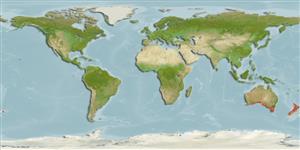Preferred temperature (Ref.
115969): 12.1 - 18.2, mean 15.2 (based on 179 cells).
Phylogenetic diversity index (Ref.
82804): PD
50 = 0.7500 [Uniqueness, from 0.5 = low to 2.0 = high].
Bayesian length-weight: a=0.00490 (0.00203 - 0.01181), b=3.13 (2.91 - 3.35), in cm Total Length, based on LWR estimates for this species & (Sub)family-body (Ref.
93245).
ระดับชั้นอาหาร (Ref.
69278): 3.6 ±0.29 se; based on food items.
ความสามารถในการกลับคืนสู่ปกติ (Ref.
120179): ต่ำ, เวลาต่ำสุดที่จะทำให้ประชากรเพิ่มขึ้นเป็น 2 เท่าใช้เวลา 4.5 - 14 ปี (K=0.06-0.47; tm=2-6; Fec=2).
Fishing Vulnerability (Ref.
59153): High vulnerability (55 of 100).
Climate Vulnerability (Ref.
125649): Very high vulnerability (83 of 100).
